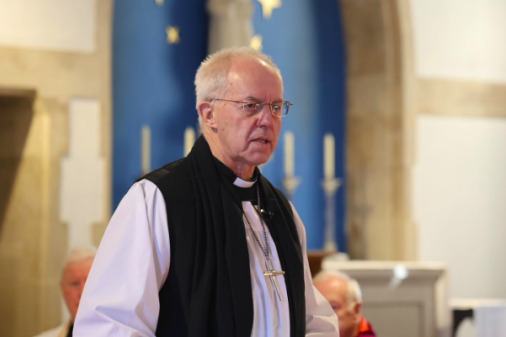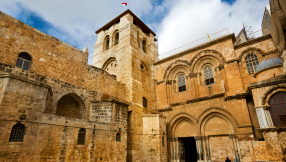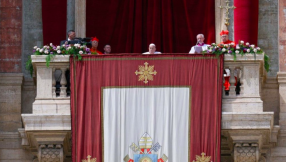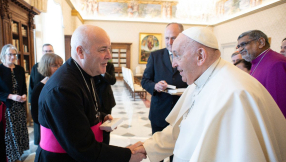
Just over 12 years ago, on 9 November 2012, I walked down the wooden stairs from the Archbishop's flat, towards Lambeth Palace's largest function room, the wood-panelled Guard Room, which was heaving with journalists. We were about to announce who would be the 105th Archbishop of Canterbury.
With me walked Justin and Caroline Welby. Justin made his oft-repeated joke, that he felt like the eyes of the figures in the paintings on the Palace walls were somehow watching him. He was full of energy, enthusiastic, almost tigger-ish at the task ahead of him. And he was evangelical.
As he finally reached the microphone the first thing Justin did was to lead a prayer: 'Come Holy Spirit to the hearts of your people and kindle in them the fire of your love.' He spoke about his optimism for the future of the church: 'we will certainly get things wrong, but the grace of God is far greater than our biggest failures.'
The grace of God is indeed greater than our greatest failures. But on Tuesday, following the publication of the Makin Report five days earlier, the Archbishop reiterated his sense of shame and sorrow for the historic safeguarding failures in the Church of England, and his personal responsibility around John Smyth in particular, and has resigned.
A long five days
For many evangelicals it has felt like a very long five days (I have written some analysis on the Makin report here for Evangelicals Now magazine). There has been an outpouring of compassion for survivors, despair over the state of the Church of England, and frustration at the contradictions and lack of clarity in what the Archbishop has said and not said - both historically and now.
There has also been criticism of evangelicals – of the 'muscular Christianity' referenced by Makin, but also of what is seen as evangelical culture, and even more worryingly, of evangelical theology. 'Perverted evangelical theology' has been accused of being part of the problem, and conservative moral positions seen as leading to sexual naivety, in a sort of horrendous victim blaming approach. Had Justin's evangelical roots, twisted by how others see Makin's report, now become a millstone?
A conversation with Rev Paul Perkin that had led Welby to explore ordination, support from Holy Trinity Brompton (HTB) stalwarts Sandy Millar and Nicky Gumbel, and a rising through the church ranks described as 'meteoric', has somehow now become a monumental fall from grace.
Where did it all start to go wrong? In 2012 when he was Bishop of Durham, few had even heard of him. Announced as the new Primate of the Church of England, he came across as a mild-mannered Etonian, the ex-oil executive that he was. One former boss described him as 'very determined, he doesn't give up easily. He is curiously relaxed in long-term negotiations... I think that combination of a relaxed approach and an absolute iron will to get things done is a powerful one'.
Justin had been on the Parliamentary Commission on Banking Standards looking into the Libor fixing scandal; 'Can companies sin?' had been the title of his dissertation at theological college. His corporate background and plain-speaking were seen as strengths that he would use to serve the Church - with the hope he could unite it despite difference.
1. Sexuality
This difference has been most apparent throughout Justin's archepiscopacy in the area of human sexuality. In that first speech in the Guard Room at Lambeth, he said 'we must have no truck with any form of homophobia, in any part of the church', affirmed his commitment to listening to LGBT communities, and expressed his desire for the church to 'need to create safe spaces for these issues to be discussed honestly and in love'.
A year later the Pilling report was published, recommending a process of what became known as the 'shared conversations' across the church, over two years, to increase understanding of the different views. Small groups spent a weekend away being taken through discussions. These completed in 2016 and the bishops considered what to do next. The consensus from the bishops was that there was little support for amending any of the current teaching on marriage, but instead that 'resources, guidance and tone needed to be revisited'. But the General Synod, unusually, didn't agree and in 2017 voted against the proposals. Nonetheless, a tweaked version of the bishops plan went ahead, which was to become Living in Love and Faith (LLF), a series of resources on theology, sociology, history and science.
The meetings of the various work streams on LLF had included 'eruptions of anger, sometimes with tears of frustration and confusion, sometimes with moments of epiphany' according to one synod speech. In very Justin-fashion, responses to the resources were asked for, and a consultation process began. Over 2022 the bishops mulled over the feedback they had received and in January 2023 published proposals to allow blessings for same sex couples, which were then voted on by the General Synod the following month.
In response, the orthodox in the Church of England began to come together. By May 'the Alliance' had been created, bringing together the Church of England Evangelical Council (CEEC), Church Society, the HTB Network, Living Out, Myriad, New Wine, ReNew and Forward in Faith. Letters were written protesting about the new proposals, including to bishops and archbishops, and talk of possible parallel structures began. We now have the CEEC's Ephesians Fund, allowing parish share to be given only to other orthodox churches. Justin's plan for unity had indeed united many evangelicals, some unexpectedly, but not united the whole church in the way he had hoped for. The proposals continued regardless, and protests to LLF began to include objections to the way the process had been done – and that the change should have required a two thirds majority in the General Synod, as an effective change of doctrine, when in fact it had just scraped a bare majority of any kind. The Archbishop much lauded for his management and ability to get things done was being accused of potentially abusing process.
This year, the General Synod voted to remove restrictions on using prayers for same-sex blessings in stand-alone services, and the CEEC committed to starting a parallel province. The Alliance soon joined their commitment. Just when we thought things couldn't be in a worse situation, only a few weeks before his resignation, the Archbishop appeared on The Rest is Politics podcast. Here he set out his view that 'all sexual activity should be within a committed relationship whether it's straight or gay. In other words, we're not giving up on the idea that sex is within marriage or civil partnership.' He also declared that this was the view of the 'Archbishop of York and I, and the bishops, by a majority'. The interview massively misrepresented many of the recent decisions on LLF, church doctrine, and the previously stated rationale for the Prayers of Love and Faith. Distinguishing between his personal view and church doctrine was just fundamentally too difficult.
2. Communion
Justin's decisions on sexuality in the Church of England have been like a pebble in a pond, with ripples that have reached across the world. Speaking on his appointment he highlighted that the Anglican Communion had experienced 'difficulties' but praised how 'Anglicans today stand firm in faith alongside other Christians under pressure in many places'. Yet exactly what standing firm in faith meant became a point of contention as his time in office continued.
As the Primate of the Church of England, the Archbishop of Canterbury also becomes the spiritual leader for 85 million people across the world, known as the Anglican Communion. In his first 20 months in post Justin, together with his wife Caroline, visited each of the 39 provinces of the Anglican Communion - a Herculean task. He deployed a narrative of family: 'a 21st-century Anglican family must have space for deep disagreement, and even mutual criticism.' Indeed, he has 'spent 30-40% of each year with the Communion'. So much time, indeed, that some critics have suggested that his time might have been better spent attending to issues in the Church of England.
Despite his relational efforts, fast-forwarding to March 2022, nine years on from his arrival as Archbishop, and the Primates meeting, for all the leaders of Anglican Provinces across the world, was yet again boycotted by Nigeria, Rwanda and Uganda due to differences over human sexuality. Time together with Welby might have been good, but the differences in theology were deemed too big to ignore.
The Lambeth Conference that had been postponed due to Covid followed shortly after, with the same Primates staying away, while LGBTQI+ activists expressed deep unhappiness at the resistance to fully endorsing same-sex relationships. Discussion was positive, but formal voting quickly went out of the window – perhaps to avoid obvious divisions between attendees. Justin Welby stated in an address to the gathered bishops that the Communion is deeply divided over same sex issues. Obvious, perhaps, but the speech was seen as symbolic of him accepting the validity of both sides within the Communion as its leader, and one of the 'instruments' of the Anglican Communion.
Then in 2023 the General Synod of the Church of England voted to let priests bless same-sex partnerships. It was like a bomb had gone off, sending what was left of Anglican unity into fragments. The Global South Fellowship of Anglican Churches (GSFA) saying they could no longer recognise the authority of the Archbishop, calling themselves 'a holy remnant' and saying they could not be in communion with those who had 'taken the path of false teaching'.
By the fourth meeting of the Global Anglican Future Conference (or GAFCON) in Kigali that year, Dr Foley Beach, GAFCON Chairman, declared 'with broken hearts, we must say that until the Archbishop of Canterbury repents we can no longer recognise him as the first among equals'. Earlier this year, the GSFA held its first meeting under its new covenantal structure, in Cairo, as they began to move membership from being focused on geography to focused on doctrine, with members of the Church of England's Evangelical Council (CEEC) present. The communique publicised at the end of the meeting vowed to 'reset the Communion'. Devastatingly for an archbishop with a stated desire to focus both on reconciliation and on the Communion, it is perhaps more divided now than it has ever been, despite his best efforts. Still a family, but a more broken one, with cracks that have been hastened and highlighted.
3. Management
Away from the issues of human sexuality, it has not been plain sailing over the Archbishop's 11 years in office either. In his first address to his diocesan synod as the Bishop of Durham, he said he believed in 'holy anarchy' - a sort of 'anarchy within an organisation, a sense of diversity, of freedom, and empowering that must move us away from a top-down, centralising, managerial approach that is the curse of the Church of England'. Over a decade later and many of us are only too aware of the decline in church attendance, but back then Justin seems almost prophetic: 'I think we are called - and it is possible - to turn round the decline in numbers, influence and effect of God's Church that has happened over the last 80 years.' Sadly, the exact opposite has happened.
Justin supported the closure of churches across the country in the Covid pandemic, in 2020, for the first time since King John quarrelled with the Pope in the 13th century. Many devastated church leaders and church goers felt bereft at such a difficult time without access to the spaces they used for prayer and worship. Dioceses continued to need funding, so demands for funds from parishes did not abate, and in 2021 the Save the Parish campaign was founded. As church plants, church grafts and exciting new mission projects became popular as recipients of national funding, many traditional parish churches felt threatened and even persecuted. Little has been done to successfully reassure them, disappointingly often leaving local suspicions when a plant or graft is suggested.
Accusations of increasing centralisation have continued, and the funding model for the church does seem to be shifting increasingly towards the centre. The reconfiguration of the national church team, around a vision and strategy team, and indeed a vision and strategy that the General Synod never truly debated or voted for has proved unpopular with many. The numbers of clergy have gone down, while numbers of Bishops, Archdeacons, Assistant Archdeacons et al continue to go up.
One of Justin's personal priorities has been evangelism. Which is a wonderful thing, even if some aspects of it could be seen as over-managed and numbers focused. There is much discussion of SMART goals, MAPs (Mission Action Plans) and targets of 'witnessing disciples' for many church leaders to meet.
For large numbers of frontline church leaders it has been a demoralising experience. Clergy mental health is at a low. And despite this epic management push, church attendance figures in the Church of England remain well below pre-Covid levels. As churches close or merge, 'managed decline' is increasingly mentioned. Justin has spoken about his personal faith powerfully throughout his time as Archbishop – from how faith has been his 'safety net' through depression and the loss of his eldest daughter, to discovering his father wasn't in fact his biological father. His very public personal witness has been wonderful and visible. But the push for bums in pews, and the increasing managerialism has been hard for many clergy and laity to bear – and likely contributed to the current volunteering crisis in the church.
4. Safeguarding
Finally, the safeguarding crisis. Perhaps the lasting legacy of Justin's time as archbishop is not just how much has improved, but the repeated revelations around how very bad things have been. The crisis of trust in the church is perhaps most connected in the public view with this. From the 2020 Independent Inquiry into Child Sexual Abuse (IICSA) saying that the church had failed to protect children and instead facilitated a culture where abusers could hide. There was the mess over Bishop George Bell, ending with the church being criticised for a 'rush to judgement' and finally in 2021 Justin saying he did not 'consider there to be a 'significant cloud' over Bishop George Bell's name' after posthumous allegations had been proved to be false. Earlier this year, the Jay report revealed that church safeguarding fell below the expected standard for even secular institutions. Professor Jay recommended that independent charities be set up; but debate on what 'independent' means seems to have been raging for an age. Now we have the Smyth case, and the revelations about the lack of follow-up that resulted in Smyth continuing to abuse and not being brought to justice.
When words are not enough
Justin has had a habit of just not saying something if it doesn't suit him. In an early interview with Giles Fraser, back when he was bishop of Durham, he admits 'I have tried to avoid saying anything'. Last week when Channel 4 journalist Cathy Newman asked him if he lies, he said, 'I don't lie on interviews. If I can't tell the truth, I don't answer the question.' Yet for many it seems he has lied over the Smyth case. There is no modern precedent for an Archbishop of Canterbury to be forced into a resignation in the way we have seen this week. Maybe those of us in the Church of England feel like we have no words left, looking at the crisis as it unfolded, and now wondering what will come next.
But the close of the Archbishop's resignation statement gives me pause for thought in a way that none of his statements has for a while. 'For above all else, my deepest commitment is to the person of Jesus Christ, my saviour and my God; the bearer of the sins and burdens of the world, and the hope of every person.' This is the statement so many in our country have pored over these last few days and will consider as the dust settles. This is the Justin I remember from before he was Archbishop, and the weight of the office truly took hold. This is the gospel, that he proclaims to us in what might be his darkest moment. And however much any of us might feel he has got wrong, he was right, in that first speech he gave at Lambeth twelve years ago – 'the grace of God is far greater than our biggest failures'. Amen.
This article was first published in Evangelicals Now and is printed here with permission.













